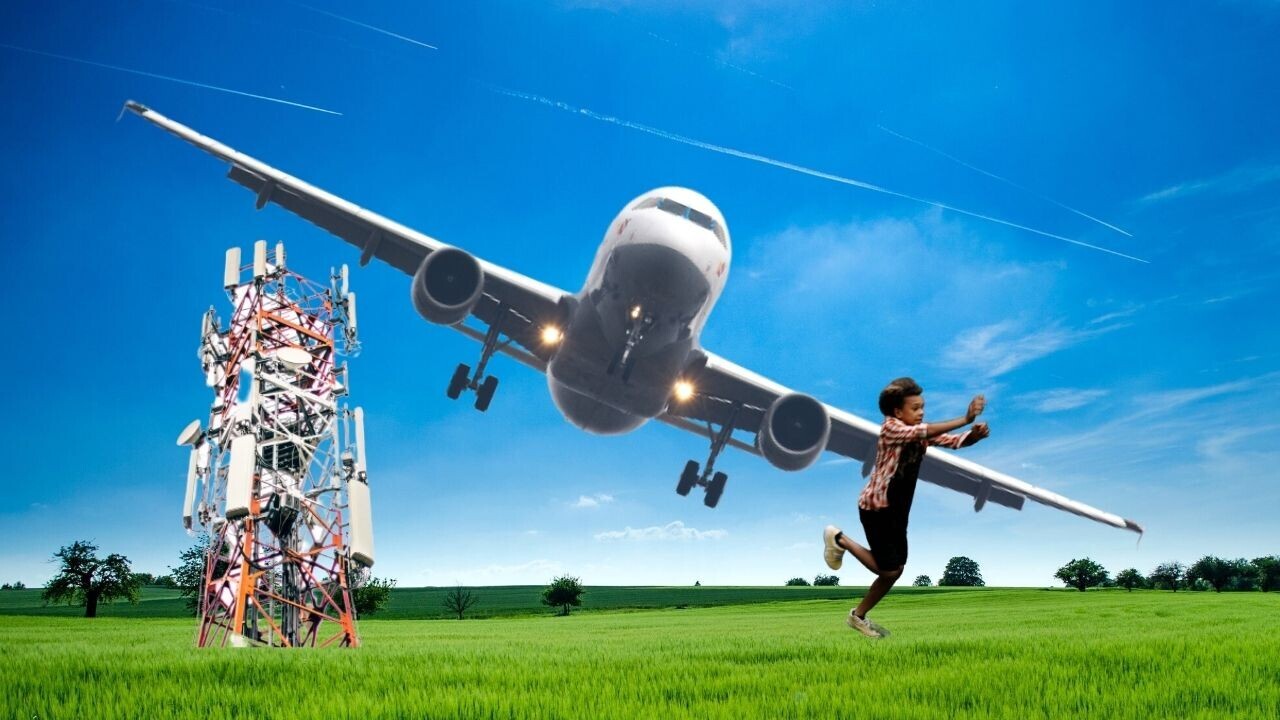
The journey to 5G is having a turbulent takeoff in the US.
The rollout of the wireless service has been partially postponed due to fears that it poses a threat to aircraft safety.
International airlines including Emirates, British Airways, and Air India canceled flights to the US on Wednesday over concerns about interference from 5G towers.
Telecoms giants Verizon and AT&T have agreed to restrict the rollout near key airports, but this hasn’t allayed the anger of the aviation industry.
In scientific terms, carriers, airlines, pilots, and passengers are really fucking pissed off. Here’s what you need to know about the drama.
What’s causing the problem?
Verizon and AT&T both run their 5G networks on the C-band spectrum, a set of radio airwaves that are expected to provide wider coverage and higher speeds.
However, there’s one big problem with it: the frequencies are close to those used by sensitive aviation instruments.
This has sparked fears that 5G towers near airports will interfere with radio altimeters, which indicate an airplane’s altitude and support safe landing.
What could this do to planes?
In 2020, the Radio Technical Committee for Aeronautics (RTCA) warned of “catastrophic failures leading to multiple fatalities, in the absence of appropriate mitigations.”
The Federal Aviation Administration (FAA) has also raised concerns.
The regulator said last November that 5G could cause “safety equipment to malfunction” and trigger “degradation to the capabilities of safety systems and other equipment that depend on radio altimeters, particularly during low-altitude operations.”
On Monday, the bosses of some of America’s biggest airlines expressed further anxieties.
In a joint letter to federal officials shared with TNW, they said 5G could lead to extensive flight restrictions and swathes of planes being grounded:
Because radio altimeters provide critical information to other safety and navigation systems in modern airplanes, multiple modern safety systems on aircraft will be deemed unusable.
Emirates president Tim Clark was a more vociferous critic. He told CNN that the rollout was “utterly irresponsible.”
"This is one of the most delinquent, utterly irresponsible issues I've seen in my aviation career."@Emirates President Tim Clark shares candid thoughts on 5G and aviation issues, cancellations, and more. #5G #aviation pic.twitter.com/hF9dlbvRVF
— Quest Means Business (@questCNN) January 19, 2022
Clark said the power and placement of 5G antenna could have grave consequences:
We were not aware that the power of the antennas in the United States have been doubled compared to what’s going on elsewhere.
We were not aware that the antenna themselves have been put into a vertical position rather than a slight slanting position, which when taken together compromise not only the radio altimeter systems, but the flight control systems on the fly-by-wire aircraft.
The evidence that 5G interferes with any of these systems remains unclear, however.
The CTIA, a telecoms lobby group, said 5G networks can safely use the C-band spectrum “without causing harmful interference to aviation equipment.”
Studies on the risks have produced conflicting results. Further investigations into the potential dangers are ongoing.
What does the aviation industry want?
The airline chiefs called for 5G signals to be excluded from “the approximate two miles of airport runways at affected airports as defined by the FAA on 19 January 2022.”
The Air Line Pilots Association, a union that represents more than 61,000 pilots in the US and Canada, also wants restrictions on the rollout.
Today we issued the following statement on the recent #5G implementation delay pic.twitter.com/bRdSbLGokQ
— Air Line Pilots Association (@ALPAPilots) January 18, 2022
The telecoms giants have acceded to some of the demands.
AT&T and Verizon have agreed to postpone switching on new telecom masts near some US airports.
In a statement, President Joe Biden thanked the companies for their response. He said the move had delayed the activation of only 10% of 5G tower locations in the country. The next step is agreeing on a permanent solution.
The FAA, meanwhile, is working to clear aircraft for instrument landings. The watchdog said on Wednesday that it had approved 62% of US commercial planes for low-visibility landings at airports where 5G is deployed.
What are the telecoms firms saying?
AT&T and Verizon have invested heavily in C-band. In 2021, the wireless carriers spent around $80 billion on licenses for the spectrum. Both companies say their networks will not interfere with aircraft.
The duo has agreed to postpone the rollout and address the airlines’ fears — but they clearly aren’t happy.
In a statement, an AT&T spokesperson told TNW that the firm was frustrated with the aviation sector. They said the industry and the FAA “have not utilized the two years they’ve had to responsibly plan for this deployment.”
Why is this only a big problem in the US?
The issues haven’t affected other countries as badly because they don’t use the same 5G frequencies as the US.
In Europe, for instance, the network operates on a wavelength that is less likely to cause interference.
Both the EU’s Aviation Safety Authority and the UK’s Civil Aviation Authority say there’s no such problem with their networks. China and Australia have also rolled out 5G without any issues with aircraft.
The AT&T spokesperson blamed regulators for the US falling behind:
We are frustrated by the FAA’s inability to do what nearly 40 countries have done, which is to safely deploy 5G technology without disrupting aviation services, and we urge it do so in a timely manner. We are launching our advanced 5G services everywhere else as planned with the temporary exception of this limited number of towers.
Critics have also pointed the finger at the federal government. They’ve blamed the Trump administration for failing to create a national spectrum policy and the Biden administration for the chaotic rollout.
Somehow, Europe’s collection of crappy governments has avoided such problems.
People on the continent are already cleared to travel with their shiny 5G phones — although it would probably be wise to turn on flight mode
Get the TNW newsletter
Get the most important tech news in your inbox each week.




